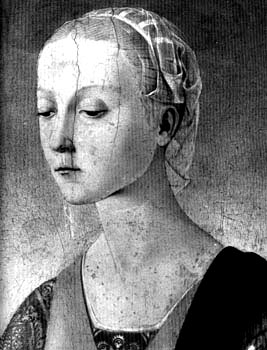|
This is a style of wearing the hair bound to the head with ribbon or “tape”, or with a
benda (a length of silk or linen veil used for covering, wrapping round or intertwining
with the hair). It is a very comfortable way to wear your hair as the weight is evenly
distributed over the head and the ribbons create a soft way of attachment. I have found
evidence of this style from the mid-1300s through around 1600. The only evidence I
have found of this style anywhere outside Italy is in France in the 16th century (I have
included 2 examples of this). All my research consisted of pictorial evidence, I have not
found any evidence in writing. I have also never come across anyone else’s research on
this subject. I welcome any feedback on my research.
In the following pages you will find instructions on two common variations of this style I
have found. These will hopefully give you enough information to try many of the other
variations I have come across. I have also included some of my pictorial evidence.
|

|
|
“The Madonna and Child (detail)”, attributed to Piero della Francesca, 15th century.
|
|